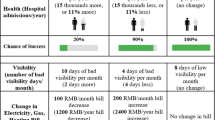
Overview
- Provides practical guidance on how to best undertake a discrete choice experiment
- Based on the expertise of eleven senior academics whose main research field is environmental valuation with discrete choice experiments
- Covers the full process of developing a discrete choice experiment: theoretical background, survey instrument, data collection, estimation and validation
- This book is open access, which means that you have free and unlimited access
Part of the book series: SpringerBriefs in Economics (BRIEFSECONOMICS)
Buy print copy
Tax calculation will be finalised at checkout
About this book
Similar content being viewed by others
Keywords
Table of contents (9 chapters)
-
Front Matter
Authors and Affiliations
About the authors
David Hoyos is an Associate Professor at the Department of Econometrics and Statistics of the University of the Basque Country UPV/EHU (Bilbao, Spain). His main area of research is focused on the economic valuation of natural resources. He is a member of the Committee of Experts of the UNESCO Chair on sustainable development and environmental education of the UPV/EHU.
Jürgen Meyerhoff is Senior Research Fellow at the Institute of Landscape Architecture and Environmental Planning, Technische Universität Berlin (Germany) and at the Institute for Environmental, Resource and Regional Economics, Kiel University (Germany) . In his work he focuses on stated preference methods, especially choice experiments and their validity and reliability. Since 2017 he is Associate Editor at the Journal of Choice Modelling.
Mikołaj Czajkowski is a Full Professor at the Department of Economics at the University of Warsaw (Poland). His research interests include preferences and choice modelling, non-market valuation, microeconometrics and microeconomics. He mostly focuses on econometric methods used to model consumers' preferences and a range of field applications, including environmental economics.
Thijs Dekker is a Lecturer in Transport Economics at the Institute for Transport Studies at the University of Leeds (UK). His research in the field of discrete choice modelling is on the cutting edge between econometrics, micro-economics and psychology. One of the strong features of his work is the use of both classical and Bayesian estimation techniques.
Klaus Glenk is a Reader of Environmental and Resource Economics at the Department of Rural Economy, Environment and Society at Scotland's Rural College (Scotland). His research focuses on the micro analysis of consumer and household decisions. He has extensive experience in the methodological development and application of stated preference methods with a focus on environmental valuation.
Jette Bredahl Jacobsen is Full Professor in Environmental and Resource Economics at the University of Copenhagen (Denmark). Her research includes non-market valuation and in particular the link to resource economics and management, focusing on topics like uncertainty, climate change, biodiversity and forests, often in interdisciplinary collaborations.
Ulf Liebe is a Full Professor at the Department of Sociology and Director of the Warwick Q-Step Centre at the University of Warwick (UK). His research focus is on discrimination, environmental behaviour, multifactorial survey experiments, prosociality, survey methodology and sustainability.
Søren Bøye Olsen is a Full Professor at the Department of Food and Resource Economics at the University of Copenhagen (Denmark). His research is focused on the valuation of non-market environmental goods with a particular emphasis on understanding consumer behaviour and preferences, often in the context of applied cost-benefit analysis and decision support.
Julian Sagebiel is a postdoctoral researcher and lecturer at the Institute of Landscape Architecture and Environmental Planning, Technische Universität Berlin (Germany). He teaches and publishes in the domain of non-market valuation and discrete choice models with applications in agricultural and environmental economics.
Mara Thiene is a Full Professor at the Department of Land, Environment, Agriculture and Forestry at the University of Padova (Italy). Her research is focused on environmental and resource economics, discrete-choice modelling, food choice, non-market valuation, agricultural and food economics, forest economics, energy economics and rural economics.
Bibliographic Information
Book Title: Environmental Valuation with Discrete Choice Experiments
Book Subtitle: Guidance on Design, Implementation and Data Analysis
Authors: Petr Mariel, David Hoyos, Jürgen Meyerhoff, Mikolaj Czajkowski, Thijs Dekker, Klaus Glenk, Jette Bredahl Jacobsen, Ulf Liebe, Søren Bøye Olsen, Julian Sagebiel, … Mara Thiene
Series Title: SpringerBriefs in Economics
DOI: https://doi.org/10.1007/978-3-030-62669-3
Publisher: Springer Cham
eBook Packages: Economics and Finance, Economics and Finance (R0)
Copyright Information: The Author(s) 2021
Softcover ISBN: 978-3-030-62668-6Published: 01 December 2020
eBook ISBN: 978-3-030-62669-3Published: 30 November 2020
Series ISSN: 2191-5504
Series E-ISSN: 2191-5512
Edition Number: 1
Number of Pages: XIII, 129
Number of Illustrations: 4 b/w illustrations
Topics: Environmental Economics, Environmental Policy, Economic Theory/Quantitative Economics/Mathematical Methods



